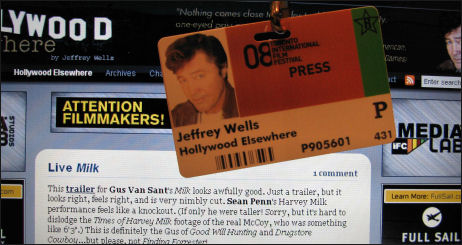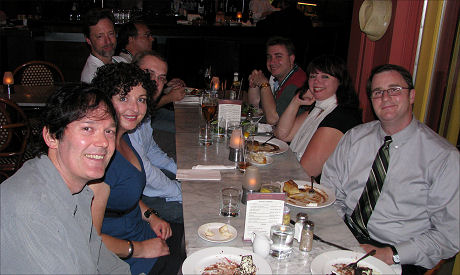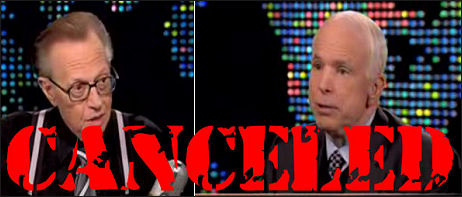I was told last night that Fernando Meirelles‘ Blindness, which I didn’t much care for when I saw it at the Cannes Film Festival, has dropped the Danny Glover narration track. That’s a good thing. As I wrote last May, “I was hoping for a film that would rigorously avoid any attempt at pushing metaphor into viewer’s faces. That is precisely what Blindness does by way of [Glover’s] narration voice-over.” I’ll be catching the new version on Saturday night.
 Jeffrey Wells
Jeffrey Wells
Who Are You?
There are two kinds of press passes being handed out at the Toronto Film Festival — P for priority and I for insect. Other interpretations: industry, invisible, inscrutable, insignificant, indelible, insubstantial, indomitable, intelligent, insubordinate.

Awkward Start
And so it begins, fumblingly. I’m staying in a street-facing room with bay windows in a pleasant b & b in Toronto’s Yorkville district, near the Dupont subway stop. The plan this morning was to rise at 6 am (3 am L.A. time), check e-mails, do some work, and get to the Sutton by 8:30 am to pick up my press pass in order to catch the 9 am press screening of Guy Ritchie‘s RocknRolla. But I didn’t set the alarm correctly on the iPhone and woke up at 8:45 am instead.

Little crucifix mints handed out by Lionsgate as a promotion for Bill Maher and Larry Charles Religulous
I stumbled around for a bit, and then put on a pair of white pants (which you’re not supposed to do after Labor Day) and headed down the hallway to take a shower. Except the door closed right behind me and locked itself, and I’d left the key in the room. So I went downstairs to find the owner-concierge and was told she was bereaved over a death in the family (happened just last night) and that I probably shouldn’t disturb her. “Uhm…well, I, you see, uhm…” Gentle diplomacy eventually resulted in finding a spare key.
This, for me, is what the Toronto Film Festival experience sometimes involves. Life is never as tidy or well-ordered as we’d like. You just have to muddle through and keep smiling and say “thanks much” and stay focused.
The room has decent wifi, a cable TV, a firm bed, a light blue rug, a small table with two hard chairs, no hangers in the closet and no towel.
Place in the Sun
I wanted to watch Sarah Palin‘s Republican Nat’l Convention speech last night, but I wanted to hang back with the gang (see below) a bit more. MSNBC’s First Read declared that “conservatives have found their Obama. Win or lose, Palin has already established herself as the future star of the party. She stayed within her comfort zone, avoiding issues she’s not up-to-speed on just yet. The only question is whether her tough sarcastic words for Obama played well with swing voters, who were hearing her for the very first time.” Reactions?
Sidenote: Malcolm Johnson has passed along the following: “In 2006, Sarah Palin defeated Tony Knowles for Governor. In preparation for the campaign, Knowles put together a 63-page “research document” about her hiistory as Mayor of Wasilla. Anita Dunn once worked on that campaign, is now working for Obama. Here it is.
$162 Including Tip

Journo confab at Toronto’s Bloor Street Cafe — (l. to r., erratic and incomplete) Toronto Star critic Peter Howell and colleague Linda Barnard, Chicago Tribune critic Michael Phillips (left rear, beard, slight smile), Cinematical‘s Kim Voynar (white scarf) and James Rocchi — Wednesday, 9.3.08, 10:15 pm. (Apologies to those I didn’t identify.)
Toronto Travel
Leaving for LAX within the hour, out of touch until sometime tonight. Maybe I can file something from the lounge before the flight.
Willy Nilly
John McCain‘s decision to cancel his appearance on the Larry King show Tuesday night was, if you ask me, another show of questionable judgment and hair-trigger temperament. He and his lieutenants reportedly became enraged over Campbell Brown‘s tough interview about Sarah Palin with McCain spokesperson Tucker Bounds, and decided to blow off the King appearance as a kind of “fuck you” to CNN.

“As a presidential campaign, we reserve the right to adjust Senator McCain’s media schedule in order to ensure the most effective use of his time,” said Maria Comella, a McCain spokeswoman. “After a relentless refusal by certain on-air reporters to come to terms with John McCain’s selection of Alaska’s sitting governor as our party’s nominee for vice president, we decided John McCain’s time would be better served elsewhere.”
McCain is obviously getting extremely prickly about all the water that Palin has been taking on, and is looking to turn things around before the worst-case- scenario (from the McCain perspective) comes to pass.
Mountain Air
Variety‘s Anne Thompson speaking a couple of days ago with Slumdog Millionaire director Danny Boyle in Telluride. I presume Anne was shooting as she spoke and vice versa, but I could’ve done without the gentle wiggle-sway effect. And what about that finger?
Vine-Swinger
Producer Jerry Weintraub wanted Guillermo Del Toro to direct a Tarzan movie (which I could see if GDT was allowed to be imaginative), but The Hobbit project got in the way of that. So Weintraub has, I’m told, reached out and found a director who knows from mummies and vampires and colliding worlds to take over the reins. Tarzan, meet…Steven Sommers!
Lion of London
The calls and the homework will have to wait since I have to be at a screening of The Women at 7:30, but the rights to make a fact-based, Born Free-like film about a lion named Christian who was born and raised in London for a year (from 1969 to ’70) and was then introduced to the wilds of Africa was recently bid upon by three studios — and Columbia triumphed, I’m told, with Neil Moritz (Vantage Point, The Green Hornet) slated to produce.
Read the Wikipedia page about Christian, and then watch the video above (and try to ignore the godawful music track). The affection is obviously real. How can this not work? Even I would see it and probably like it. If it isn’t overly sweetened and sentimentalized, that is.
